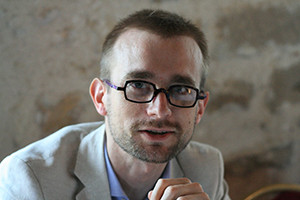Baptiste Coulmont, senior professor at the Ecole Normale Supérieure Paris-Saclay, researcher on leave at INED in 2016-17
What path brought you to INED

Before coming to INED I trained and worked as a sociologist. I did my PhD at the École des Hautes Études en Sciences Sociales (EHESS) under the supervision of Danièle Hervieu-Léger and obtained an associate professorship at Université Paris 8. My initial areas of interest were religion and sexuality. Then, as part of a course I was teaching, I began studying first name choice. I identified a few practices that sociologists knew little about: people changing their first names, and immigrants’s and immigrants’ children’s process of choosing first names for their children. Around twelve years after defending my PhD thesis and two years after obtaining accreditation to supervise PhD research, I applied to spend a leave period at INED.
What have you been working on at INED?
To begin with, being at INED has been a break from everyday academic life. When I left [University] Paris 8, I specified that I did not wish to be kept informed of my colleagues’ activities there (no emails, no meetings). At INED I joined the “International Migration and Minorities” research unit and participated in their various seminars. I also attended INED study days and conferences as often as possible.
My goal was two-fold. First, to train in sociology of migration. Second, to study a particular major survey—Trajectories and Origins (TeO)—in detail and without haste so as to grasp the subtlety of it. That survey led me to a better understanding of the determinants of immigrants’ and immigrants’ children’s first name choices for their children in France in the early 2000s.
What would you say is specific about INED?
I would say there are two specificities. First, there’s INED’s expertise in doing major public statistics surveys. I knew even before coming here that there would always be a researcher, research technician, or PhD student to answer a precise question on a point that may be obscure but is essential for processing specific information.
The second is that, for me, arriving from a university that has little in the way of offices, there’s a definite office spirit at INED: working hours, coffee breaks, meals together at the cafeteria, etc. This was very useful for me during my leave, because one of my goals was to make contact with distant colleagues, among others.
What is involved in being a teacher-researcher on leave?
The leave period gave me the time to reflect and explore a statistical survey that encompasses several hundred variables. A university work day is broken up into meetings, classes, class preparation, appointments with students, and various administrative tasks. Being on leave made it possible for me to “defragment” my work days because I no longer had absolute deadlines—and so to reflect. As for exploration, I was able to produce dozens and dozens of drafts, tables, avenues for further research and ideas to explore now or later, without pressure to publish quickly. I’ve been able to acquire reflexes that are of great help now for studying statistical surveys.
(Interview conducted in June 2021)
